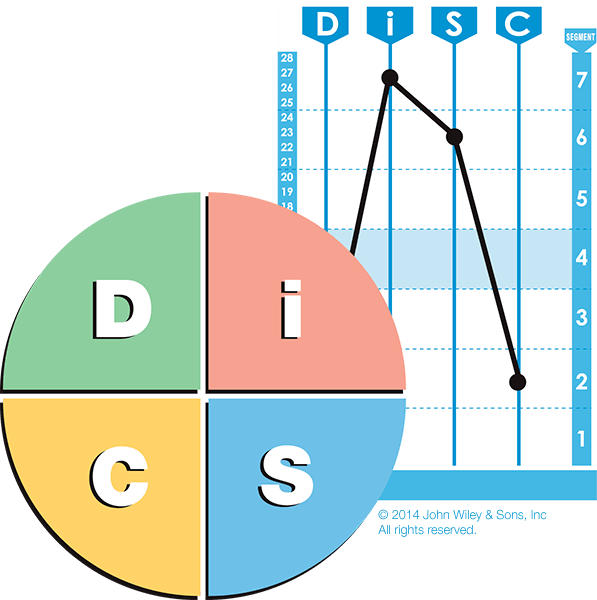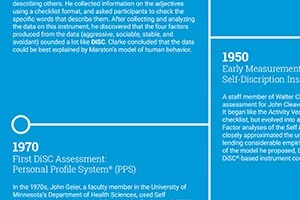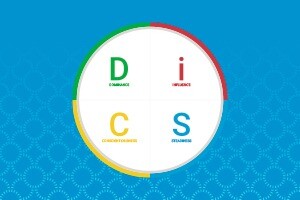DiSC est conçu pour vous aider à mieux vous comprendre, et à mieux comprendre les autres, pour ainsi améliorer vos relations de travail, renforcer vos compétences managériales ou résoudre vos conflitsavec un nouvel état d’esprit.
Everything DiSC existe en plusieurs applications, spécifiques, spécifiques au contexte du dirigeant, du manager de proximité, du membre d’une équipe, ou du vendeur.
Everything DiSC a fait l’objet de 40 ans de recherche. Le profil papier DiSC Classic fut le premièr du genre !
Everything DiSC
Test de Personnalité en Entreprise
DiSC : un modèle en 4 couleurs simple à utiliser et retenir

Les tests de personnalité Everything DiSC ne valorisent pas un profil type en particulier car chaque personne a un profil comportemental unique. Les gens ont tous des styles et des priorités différentes. Ces différences sont extrêmement précieuses. Exploiter chaque type de personnalité en entreprise permet d’optimiser la communication dans le milieu du travail.
Les profils Everything DiSC utilisent une évaluation avancée (adaptative et des algorithmes sophistiqués pour analyser rapidement les réponses d’une personne et fournir un retour personnalisé. Cela ne prend que 15 minutes environ.
DiSC: une évaluation, un profil, des outils d’apprentissage en atelier et de suivi
L’EVALUATION
LE PROFIL
L’ATELIER
OUTILS DE SUIVI
La suite d’applications Everything DiSC
Workplace
Incitez chaque individu à construire des
relations plus efficaces au travail
Mon avantage
- Découverte de soi en
profondeur - Apprécier les différences de styles de travail
- Stratégies pour des interactions efficaces
Management
Aide le manager à mieux impliquer, motiver
et développer ses collaborateurs.
Mon avantage
- Mon style préféré de management
- Mieux diriger, déléguer & motiver
- Strategies de développement long termes
Productive conflict
Du conflit à l’opportunité : du comportement destructif aux réponses constructives.
Mon avantage
- Mes réactions au conflit
- L’impact sur les autres,
réactions au conflit - Réaction : destructive à constructive
_
Sale (en anglais)
Le vendeur adopte une conduite pour s’adapter aux préférences des clients
Mon avantage
- Découvrte de mon style de vente
- Appréciation des différences de style
- Adapter mon approche commerciale au besoins et au style du client
Work of leaders (anglais)
Leaders percutants grâce au processus de vision, d’alignement et d’exécution
Mon avantage
- Un modèle de leadership
simple - Perspectives personnalisées pour se renforcer et surmonter les défis
- Un chemin claird’amélioration
Agile EQ (anglais)
Acquérir l’intelligence émotionnelle nécessaire pour une culture agile
Mon avantage
- Découvrez vos forces QE
- Reconnaissez votre
potentiel QE - Une stratégie sur mesure
pour affiner et renforcer
votre QE
Ressources: histoire et recherche Everything DiSC

Everything DiSC Research Report

L'histoire de Everything DiSC

Everything DiSC : Théorie et recherche
FOIRE AUX QUESTIONS
Outils DiSC : pour un meilleur management
Qu'est-ce que le modèle DiSC ?
- Dominance (rouge) ;
- Influence (jaune) ;
- Stabilité (vert) ;
- Conformité (bleu).
Pour déterminer le comportement principal d’un individu, Marston a utilisé deux axes. Le premier exprime sa vision de la situation dans un environnement (favorable ou hostile), tandis que le deuxième sur sa propension à agir dans cet environnement (acceptant ou agissant). Cette connaissance de soi vous aide à bien communiquer et à comprendre vos faiblesses.
Sachez que le modèle DISC facilite aussi l’identification des dominantes psychologiques des individus dans un environnement de travail. En tant que manager grâce à l’outil DISC, vous serez en mesure d’adopter un management adéquat si vous parvenez à percevoir le trait dominant de chacun de vos collaborateurs.
Quelles sont les typologies de profils DiSC ?
Le profil Disc dominant
Fonceur, puissant, déterminé, tenace, affirmé et souvent visionnaire, le profil dominant recèle d’un potentiel extraordinaire. Ce profil à tendance extravertie ne cherche pas à tourner autour du pot. Il est direct dans son mode de communication (verbale, gestuelle ou non verbale) et n’hésite pas à prendre la parole.
Elle peut paraître autoritaire et agressive avec son entourage, un potentiel danger pour la cohésion d’équipe. Par contre, cette personne a un esprit de compétition, ce qui lui permet de se concentrer sur ses objectifs. Elle s’appuie sur les faits pour agir et avancer. Les chefs d’entreprise et les grands intellectuels partagent ce type de personnalité.
Le profil Disc Influent
La personne ayant le profil Disc influent est de nature sociale, amicale, optimiste, très démonstrative et enthousiaste. Celle-ci entretient un très bon relationnel, ce qui lui permet d’être une personnalité appréciée au sein de l’équipe. Grâce à sa personnalité, elle aime les collaborations et fonctionne selon un mode démocratique.
Néanmoins, cette personne est parfois superficielle dans sa façon de trouver des problématiques et de gérer les dossiers. Son objectif est de susciter l’enthousiasme, de chercher à convaincre, de rechercher la reconnaissance et la collaboration.
Le profil Disc Stable
La personne ayant le profil Disc Stable est de nature calme, patiente, méthodique, loyale, sérieuse, fiable et humble. Ce profil de personnalité, à tendance introvertie et souple, est plutôt résistant au changement. Il est capable d’écouter son interlocuteur et ne s’impose jamais. Il sollicite le travail d’équipe. Son objectif est ainsi de prioriser le soutien et la collaboratio et de rechercher l’équilibre.
Le profil Disc Consciencieux
La personne ayant le profil Disc Consciencieux est de nature discrète, précise, factuelle, autonome, méthodique, organisée, structurée et analytique.
Souvent perçu comme froid et autoritaire, ce genre de profil est à l’aise dans les métiers comptables ou administratifs. Sachez que la personne à tendance introvertie, rigide, et centrée sur les tâches aime l’ordre et suivre les règles. Son objectif est de prioriser la précision, l’équilibre (suivi et modération) et les défis.
Pourquoi utiliser le modèle DISC dans le management ?
- Mieux connaître les autres pour communiquer efficacement ;
- Comprendre les autres et d’adapter à la personnalité ;
- Adopter une écoute empathique et de gérer les situations difficiles ;
- Encourager la communication ;
- Vendre et manager en couleur ;
- Améliorer le savoir-être pour établir des relations positives ;
- Établir un esprit d’équipe
Dans le processus de recrutement, le DISC permet au recruteur de mieux se connaître et comprendre le propre comportement du candidat en cas de stress par exemple. Ainsi, cette clé de communication vous aide aussi à identifier ses motivations, ses faiblesses, ses points forts, ses capacités relationnelles et ses aptitudes.
Dans le process communication management, il permet d’adapter la communication pour mieux se comprendre et mieux coopérer grâce à l’empathie suscitée. Enfin, l’outil DISC vous permet d’adapter à des interlocuteurs et d’anticiper son processus de décision, dans l’approche commerciale.
